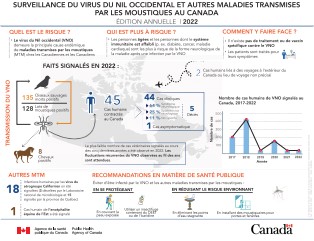West Nile virus and other mosquito-borne diseases surveillance in Canada: Annual edition 2022 (infographic)

Download in PDF format
(253 KB, 1 page)
Organization: Public Health Agency of Canada
Published: 2025-04-03
What is the risk
West Nile virus (WNV) is the leading cause of domestically acquired mosquito-borne diseases (MBD) reported in Canada
Who's at greater risk
Advanced age and people with underlying medical conditions (e.g. diabetes, cancer, heart disease) are at increased risk of WNV neurological syndrome
How to manage
There is no specific treatment or vaccine for WNV. Patients are treated for their symptoms
West Nile virus reported in 2022
- 135 positive dead wild birds
- 128 positive mosquito pools
- 8 positive horses
- 45 human cases acquired within Canada
- 44 clinical cases
- 64% neurological syndrome
- 25% non-neurological
- 11% not specified
- 5 deaths
- 1 asymptomatic case
- 2 travel-related human cases acquired outside of Canada or travel location not specified
When compared to the average of the previous 5 years, a lower number of human cases was observed in 2022. Recurring fluctuations in the number of WNV human infections from year to year are expected.
Other mosquito-borne diseases
- 18 human California serogroup virus infections were reported:
- 3 identified by the National Microbiology Laboratory
- 15 reported by Québec
- One human case of Eastern equine encephalitis was reported
Public health recommendations
Avoid becoming infected with WNV and other mosquito-borne diseases by:
- Protecting yourself
- Cover exposed skin
- use insect repellent with DEET or icaridin
- Reducing surrounding risk
- eliminate standing water
- maintain window and door screening